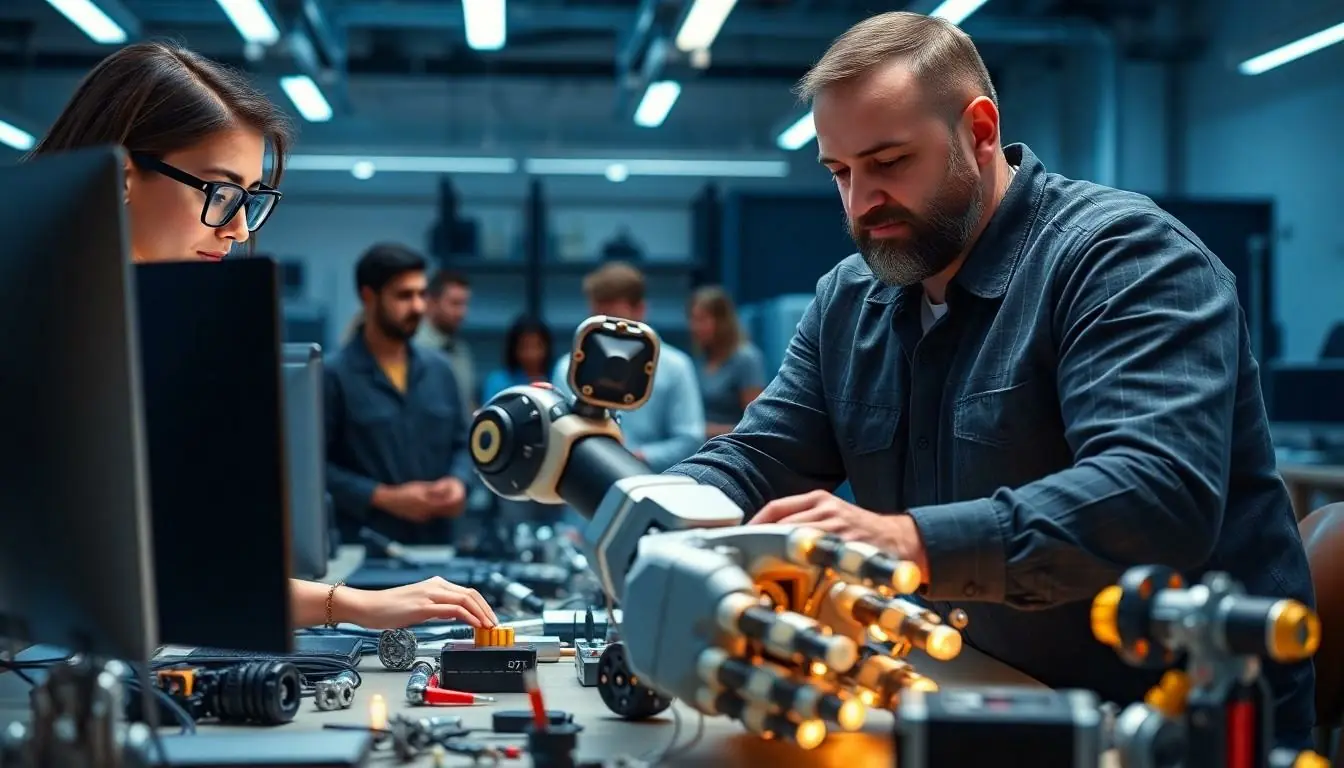Table of Contents
ToggleIn a world where robots are no longer just the stuff of sci-fi movies, the job market is buzzing with opportunities that would make even R2-D2 jealous. From designing the next generation of automated assistants to programming drones that deliver pizza (yes, please), careers in robotics are shaping the future and offering a playground for tech enthusiasts.
Imagine waking up every day to a job where you can tinker with machines, solve complex problems, and maybe even teach a robot to dance. With industries racing to integrate robotics into their operations, there’s never been a better time to dive into this exciting field. Whether you’re a seasoned engineer or a curious beginner, the robotics job market is ripe for the picking, and it’s calling your name louder than a malfunctioning vacuum cleaner on a Tuesday morning.
Overview of Jobs in Robotics
Robotics jobs encompass a wide range of roles, catering to various skills and interests. Engineers design robotic systems and components, focusing on functionality and efficiency. Software developers write code to enable robots to perform specific tasks, ensuring seamless operation and user interaction. Technicians maintain and troubleshoot robotic equipment, keeping systems running smoothly in production and service environments.
Research scientists explore new technologies and methodologies to advance the field, pushing boundaries of what’s possible. Project managers oversee robotics projects, coordinating between teams and managing timelines to ensure successful implementation. Sales professionals specialize in robotic solutions, helping businesses understand the benefits and applications of automation technologies.
The job market for robotics is expected to continue growing rapidly. According to the Bureau of Labor Statistics, employment in robotics-related fields could grow by 9% from 2020 to 2030 in sectors such as manufacturing and healthcare. Opportunities also exist in emerging areas like autonomous vehicles and smart home technologies.
Skills in programming languages such as Python and C++ are in high demand. Familiarity with machine learning and artificial intelligence enhances a candidate’s profile in this competitive landscape. Networking and professional development play crucial roles in building a successful robotics career, as industry connections can lead to valuable opportunities.
Overall, jobs in robotics offer a dynamic and innovative environment. Individuals passionate about technology and problem-solving can find fulfilling careers that shape the future of automation.
Types of Jobs in Robotics

Jobs in robotics span various fields, each contributing uniquely to the industry. The dynamic nature of this sector requires diverse skill sets.
Engineering Positions
Engineering positions play a crucial role in robotics, focusing on designing and building robotic systems. Mechanical engineers develop hardware components while electrical engineers create the circuitry. Software engineers write algorithms that direct robotic functions, ensuring seamless operation. Experts in system engineering integrate different subsystems, enhancing performance and reliability. Collaboration among these engineers is vital, as multidisciplinary approaches often lead to innovative solutions. Companies value proficiency in software tools and design principles, making education in engineering disciplines essential.
Research and Development Roles
Research and development roles focus on advancing robotic technologies through innovation. Research scientists explore new concepts in artificial intelligence, computer vision, and robotics. Development engineers test prototypes, refining designs based on performance data. Individuals in this area often collaborate with academic institutions and industry partners to push boundaries. Those interested in this field frequently have advanced degrees, strong analytical skills, and a passion for experimentation. Companies appreciate professionals who stay current with emerging trends and technologies.
Technical Support and Maintenance
Technical support and maintenance roles ensure robotic systems operate smoothly over time. Technicians are responsible for troubleshooting issues that arise in robotic systems, performing necessary repairs. Professionals in this field often provide training and assistance to users, enhancing the overall experience. Maintenance engineers implement regular checks to prevent malfunctions, minimizing downtime. Knowledge of mechanical systems and software platforms is critical for success in these roles. Organizations seek individuals who possess strong problem-solving skills and can work under pressure.
Skills Required for Jobs in Robotics
Skills in robotics demand a blend of technical and soft abilities. Employers prioritize candidates with a diverse skill set to drive innovation and efficiency in robotic applications.
Technical Skills
Proficiency in programming languages, including Python and C++, stands out as essential. Knowledge of machine learning enhances a candidate’s marketability. Familiarity with embedded systems contributes significantly to development efforts. Experience working with robotics frameworks and tools, such as ROS (Robot Operating System), offers a competitive edge. Understanding control systems and automation technologies is crucial for designing effective robotic solutions. Familiarity with sensor technologies and robotic hardware further strengthens an applicant’s skill set. Robotics engineers often use simulation software to test designs, making experience in that area valuable.
Soft Skills
Effective communication plays a key role in collaborative projects within robotics. Teamwork enhances the overall innovation process among engineers and researchers. Flexibility enables professionals to adapt to rapid technological advancements in the field. Problem-solving skills help tackle complex challenges that arise during project implementation. Critical thinking fosters the ability to analyze and improve robotic systems. Time management allows individuals to meet project deadlines efficiently. Creativity stands central to designing novel solutions and functionalities in robotics.
Future Trends in Jobs in Robotics
Robotics continues to evolve rapidly, influencing various industries and presenting new job opportunities. The shift toward automation fuels demand for skilled professionals in sectors like manufacturing, healthcare, and logistics. Analysts project that jobs in robotics will grow by 9% from 2020 to 2030, signaling strong career prospects.
Emerging technologies, such as autonomous vehicles and smart home systems, expand the job landscape. Engineers, developers, and researchers play critical roles in these advancements. Automation trends lead to the creation of specialized positions that focus on designing and overseeing robotic solutions.
Increased integration of artificial intelligence advances job roles in robotics. Employers increasingly seek candidates adept in machine learning and analytics to drive innovation. Understanding data handling and algorithm development becomes essential for those entering this field.
Collaboration among interdisciplinary teams remains vital for success in robotics. Diverse skill sets enhance problem-solving capabilities and foster creative solutions. Engineers must work alongside software developers, data scientists, and project managers to bring projects to fruition.
Remote monitoring and maintenance techniques become more prevalent, creating demand for technicians skilled in these areas. As robotics systems grow more complex, effective troubleshooting becomes critical for maintaining operational efficiency. Individuals who excel in this aspect will find ample opportunities.
Adoption of robotics in everyday applications leads to higher public interest and job growth. Technological advancements push for constant adaptation and continuous learning among professionals. Staying informed about industry trends and pursuing ongoing education enhances job prospects in this dynamic field.
The future of jobs in robotics is bright and full of potential. As industries continue to embrace automation and advanced technologies, the demand for skilled professionals will only grow. With diverse roles available and a focus on innovation, individuals can find fulfilling careers that challenge their creativity and problem-solving abilities.
Staying updated on industry trends and continuously developing skills will be crucial for success. Those who are passionate about technology and eager to adapt will thrive in this dynamic field. The journey into robotics is not just about securing a job; it’s about being part of a transformative movement shaping the future.






